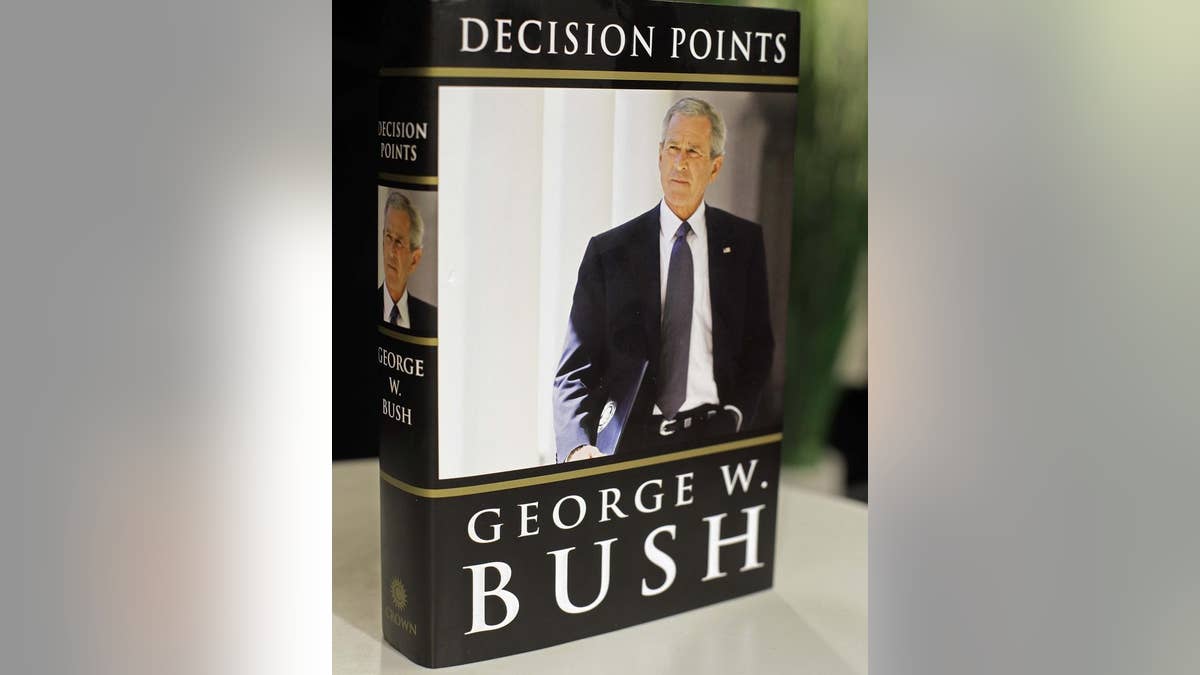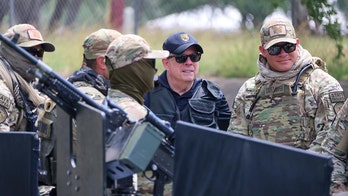
AP Photo
In his new book, President Bush takes a different approach to presidential memoirs. In "Decision Points," he lays out 14 decision points in his presidency, many not of his own choosing but rather forced on him by events.
Terry Holt, a former aide says, "when you read this book, you're gonna see a guy that really had the weight of world literally on his shoulders for almost every moment of the 8 years of his presidency."
And it started early, when terrorists launched the worst attack on American civilians in our history-- the day now known simply as 9/11. From then on, the war against terrorists and those who might help them defined the rest of the Bush presidency.
The U.S. soon launched attacks against Al Q'aeda and its supporters in Afghanistan.
Then came the war in Iraq. President Bush explains in the book how the US had spent years working through the United Nations, an effort to contain Saddam's ambitions for weapons.
"Saddam Hussein didn't just pursue weapons of mass destruction. He had used them," Bush writes. "He deployed mustard gas and nerve agents against the Iranians and massacred more than five thousand innocent civilians."
The latter is a reference to a chemical attack on a Kurdish village in Halabja where men, women and children fell where they were standing.
That episode and others, convinced President Bush and intelligence agencies the world over that Saddam was hiding a massive weapons program including nuclear. And the former President tells Fox's Sean Hannity he was shocked when none were found.
"Unbelievably frustrating," he says. "Of course it was frustrating. It -- everybody thought he had WMD. Everybody being every intelligence service, everybody in the administration. Hannity responded, "A lot of Democrats said it." President Bush added, "Yes, a lot of members of Congress." In fact, the most prominent of democrats -- those who ran for President against Mr. Bush -- repeatedly expressed the same conviction.
Former Senator Al Gore said in 2002 that, "Iraq's search for weapons of mass destruction has proven impossible to completely deter and we should assume that it will continue for as long as Saddam is in power."
The same year, Senator John Kerry said, "The threat of Saddam Hussein with weapons of mass destruction is real."
And he argued that required action."I believe that a deadly arsenal of weapons of mass destruction in his (Saddam's) hands is a threat, a grave threat, to our security and that of our allies in the persian gulf region."
Once President Bush had made the decision, he wrote a letter to his father, who not only served as President but also tangled with Saddam Hussein himself. The younger Bush wrote to his Dad telling him he had ordered US troops into war. "I know i have taken the right action and do pray few will lose life. Iraq will be free, the world will be safer."
His father, the first President Bush, had fashioned a coalition of 34 nations to kick Saddam's invading forces out of Kuwait and chase them back into Iraq.
Bush the younger wonders about what might have happened had US forces gone after Saddam at that point, but he readily notes that the mission his father had asked Congress to approve was limited, and when the Iraqi forces had been pushed back into Iraq, fighting all the way, he withdrew US forces.
And when his son sent forces to Iraq, his father wrote, "You are doing the right thing...you have done that which you had to do."
"Maybe it helps a tiny bit," his father wrote, "as you face the roughest bunch of problems any President since Lincoln has faced: you carry the burden with strength and grace..."
A chapter in the ensuing debate over Iraq also angered Vice President Dick Cheney. He wanted the President to pardon his aide, Scooter Libby, who was convicted of perjury and obstruction of justice in the investigation of who outed CIA officer Valerie Plame. She was involved in a dispute over pre-war intelligence.
The president decided to only commute the sentence and explains the move saying
"The jury verdict should be respected. In one of our final meetings, I informed Dick that I would not issue a pardon."
The Vice President was not happy, Mr Bush writes. "He stared at me with an intense look. "'I can't believe you're going to leave a soldier on the battlefield,' he said."
President Bush also faced controversies over entirely domestic matters, the biggest of which was Hurricane Katrina.
The former President writes that in Mississippi, "Eighty miles of coastline had been obliterated."
The storm missed New Orleans and it initially appeared safe. But then a storm surge broke though the levees and it suffered devastating flooding.
The President had worried as the storm was approaching because local officials were not acting. A concerned President Bush called Louisiana Governor Kathleen Blanco. "What's going on in New Orleans?," he asked.
Mayor Nagin had not ordered a mandatory evacuation and the President implored the Governor to step in.
"The mayor's got to order people to leave. That's the only way they'll listen. Call him and tell him," he urged.
Mayor Nagin finally did, but when the flooding came, the federal government couldn't help out unless asked.
"I was stuck with a resistant governor," Mr Bush writes, "and an antiquated law. I wanted to overrule them all. But at the time, I worried that the consequence could be a constitutional crisis."
But right or wrong, the Bush administration got most of the blame. And the former President writes that it, "eroded citizens trust in their government...and cast a cloud over his second term."




